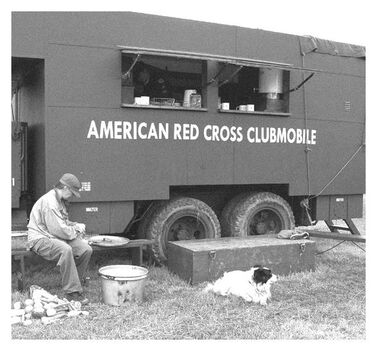 The Red Cross Girls based at Thorpe Abbotts had a good amount of screen time in this week's episode. "Masters of the Air" is adhering very faithfully to the experiences of Eighth Air Force airmen based in East Anglia, and there's much to appreciate about the depiction of the Red Cross Girls. We got a great look at the Clubmobile (which is, as I predicted in my previous blog, the GMC truck model like the one you see pictured here) in two different scenes. Helen is wearing the battledress Clubmobile Girl uniform in the pre-mission scene with Lieutenant Nash and later during post-mission service, and I loved the glimpses of her Red Cross pin worn at the collar of her shirt. I appreciate the implicit nod to how hard the women worked - it is absolutely historically accurate that the women were up at dawn to provide coffee and freshly-made doughnuts to the crews and that they were there again when the men returned. It was a nice touch to show that they were there both to greet the returning crews and offer the coffee and doughnuts as they went in for debriefing (you'll note that some of the men were downing shots of whiskey too) and again outside the debriefing hut with the Clubmobile. 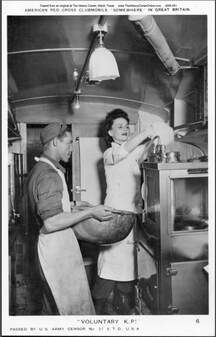 While viewers can deduce that the women worked hard, they might not realize that the women made the coffee and doughnuts themselves each morning. We know Helen enjoyed dancing and canoodling with Lieutenant Nash until late that night, but she was also out of bed well before dawn to go fire up the doughnut machine. Helen alludes to that when she teases Lieutenant Nash that they've only been apart for 4 hours. She might or might not have had a helper as the Red Cross Girl pictured here had, but typically one of the women took the early shift of doughnut-making and the others showed up as the crews left breakfast and headed to the briefing room. 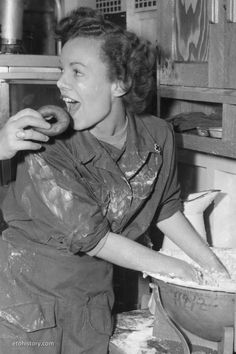 The doughnut machine was finicky, and Helen would have begun her morning by hefting 100-lb bags of doughnut mix, contending with the hot grease, and feeling as though she would never get the smell of grease and doughnuts out of her clothing. She likely wore the flight coveralls that you see Sergeant Lemmons and the maintenance crews wearing to make the doughnuts, changing into the sporty Battledress uniform when it was time to serve the fellas. The Clubmobiler pictured here is clearly wearing flour-spattered flight coveralls to make doughnuts. The women would take those coveralls out to the linemen and have them dunked in aviation fuel (high-octane aviation fuel was the only thing that would cut the smell) before hanging them out to dry. Obviously the producers had limited screen time to devote to the development of the Red Cross Girls -- the focal point of the series rightfully belongs with the sacrifices of the valiant Eighth Air Force crews. But I think even the small snippets of dialogue between Lieutenant Nash and Helen while dancing could have been an opportunity to give viewers a more nuanced sense of who these women were and the important role they played. Like Lieutenant Nash, most servicemen were astounded but grateful that these women had braved the dangers of crossing overseas on a troop ship to provide cheer, comfort and yes, coffee, to the soldiers engaged in active military duty. But Helen wouldn't have been all that likely to say "well I wanted to help and this is what I got," as though she'd assumed volunteering with the Red Cross would involve rolling bandages back home and instead found herself surprisingly at an airbase near an English village. The Red Cross Girls who made it through the exacting application and interview process (only 1 in 6 were successful at gaining an overseas posting) were, as one wrote in a letter to family, the "cream of the crop." They were proud of being selected and understood that, like the men, they were in it "for the duration." I wish the dialogue for Helen had conveyed more pride in what she was there to do and what it had taken for her to get there. There were several Red Cross Girls in the background of the dance scene, notably Tatty Spaatz was the one near the bar (she stoops to pet Meatball) talking to a group of men just before they have a conversation about the trauma of aerial combat and the number of men who are becoming "flak happy" -- that was the slang term for what we now know would have been PTSD. I also appreciated that Tatty's presence in that circle of officers was accepted (she wasn't shooed off when the conversation turned more serious). 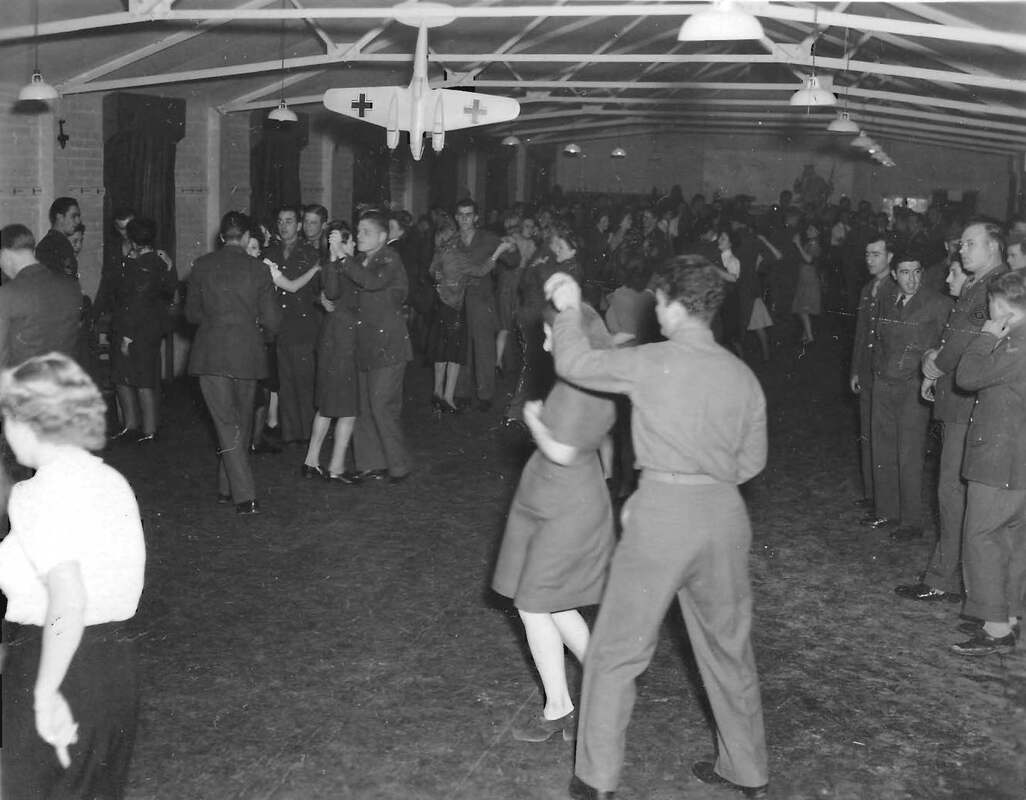 American Red Cross Aeroclub Dance, 305th Bomb Group, Chelveston, England, 1944 American Red Cross Aeroclub Dance, 305th Bomb Group, Chelveston, England, 1944 Like the one in Episode 2, this dance scene was clearly at the officer's club rather than the Red Cross Club for the enlisted men. If it had been at the ARC-run Aeroclub we would have seen the Red Cross Girls in a more active hostess role. The women did attend officer's dances (and yes, typically wore their dress uniforms to the officer's club events), but they also hosted dances, game nights, theater and musical productions, quiz bowls, and the like at the AeroClub most nights. Doubtless, while Helen and Tatty were enjoying the officer's club dance (yet knowing they must get up in mere hours to make doughnuts and coffee for the pre-mission service!), there were other Red Cross Girls hosting some sort of social event for the enlisted men on the base. It seems I was somewhat off-base in my interpretation of this scene between Helen and Lieutenant Nash from the trailer snippet last month. He's throwing her own flirtatious words from their dance the night before back at her ("you might be the last pretty face I ever see"). But her smile slips just for an instant as she recognizes that this man whose company she's already enjoying could very well die in that day's mission. She's not, as I had predicted, a new Red Cross Girl who doesn't appreciate the odds, doesn't know she will experience the anguish of losing men she had chatted or joked with, danced with, kissed or fell in love with. No, Helen is aware, her flirty banter aside, that Nash's odds of returning that afternoon are much lower than she would like. The expression on her face when Lieutenant Rosenthal confirms that Nash and his crew didn't return segues quickly from shock to grief to stoicism. The Red Cross Girls had to be tough, physically and emotionally. "Masters of the Air" is showing us this, and my hope is that readers of this blog will gain a stronger appreciation for the nuances of their depiction.
2 Comments
2/13/2024 08:29:49 am
I don't have Apple, etc. so am not watching Masters of the Air but I have read your books. I'm pleased to see how you are writing about the shows and continuing the education of your readers.
Reply
2/16/2024 06:16:46 am
Thanks Judith! I hope "Masters of the Air" is eventually released in a format where you can watch it, but I'm glad you're enjoying my blogs!
Reply
Leave a Reply. |
AuthorI'm the author of historical romances set during WWII. Archives
February 2024
Categories
All
|
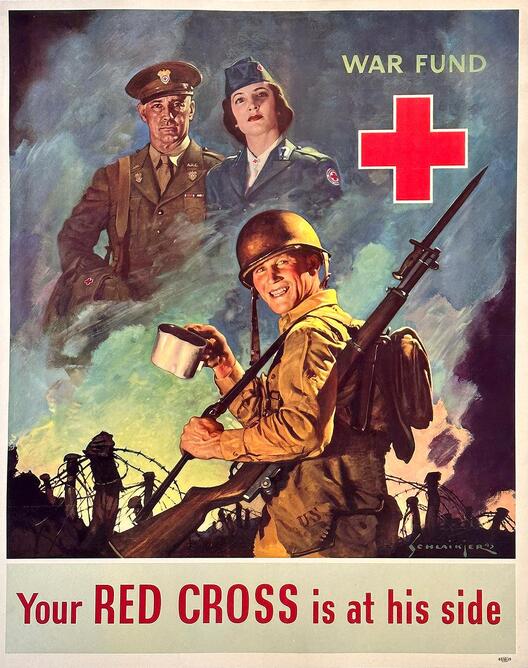
 RSS Feed
RSS Feed